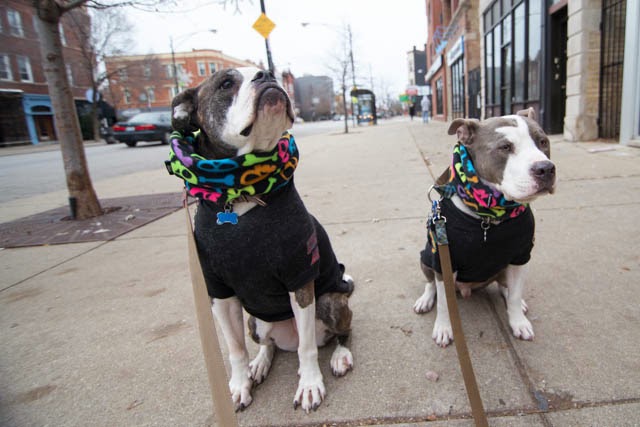While I always had dogs growing up, Miss M was the first dog I ever had on my own. I was a bit nervous to have my own dog, especially after being led towards a misguided Wiki-article predicting
all types of dire traits. While these types of blanket statements are never true, it did scare me into becoming over-prepared and developing a solid training plan once Miss M came into my apartment.
Vintage Miss M came to me as an excited, stubborn pup who knew what she wanted...and she wanted it now. While she will always have
an over-the-top personality, we were able to develop some routines to help her make better decisions and become a polite dog.
We know all dogs are different, but these are some things that worked for us:
Start out Hard Because There's No Going Back
A friend of mine used to joke that I treated Miss M like she was in boot camp. Sure she had a lot of rules, but I also knew it was easier to set up a lot of rules up front because it would be harder to go back and have her un-learn a behavior. One of my biggest things was not letting Miss M on the sofa. I knew I could one day choose to allow her on the furniture in the future, but if I started out by letting her sit on the furniture I could never change my mind since it would be that much harder to train her to stay off.
We were also very strict about following the
'Nothing in Life is Free' principle. Miss M learned to work for every privilege. She wasn't allowed to just eat dinner, but she had to go to her bed, lay and wait as the food was placed before her. She wasn't allowed to eat until I gave her the command. She also learned to be in a down-stay before putting the collar on for walks, and she would never just get a treat but she would have to perform some kind of trick for it. (When she was newer it would start with just a sit, but it would work up to a wave, and
eventually this!)
I can see how this looks intense to an on-looker, but Miss M could get very excited and these rules helped her learn patience, self-discipline, and understanding our routine. Now it has become automatic where sit has become the pups' default behavior.
Be Consistent
While Miss M was learning all of these routines, the biggest thing I needed to do was to be consistent. Sure, it was tempting to save time by just giving her dinner, throwing a leash on her if I was in a hurry, and giving her a treat just because she looked cute, but having a familiar routine is extremely important for dogs and not following the pattern could cause set-backs.
We also make sure to
consistently practice their training in new situations.
Using "Wait Time"
This is one of the biggest things I learned from teaching that I'm able to use on the pups. The idea behind wait time in the classroom is that after you ask a question you need to stop and wait to allow students to process what is being asked. Sometimes it seems like an uncomfortable amount of time and it's so tempting to just ask the question again, or rephrase it. Though I've learned if I do wait, even if it seems like a long time, I will always have a student answer or at least ask for clarification.
I started doing this with the pups when I give them commands. If they aren't responding immediately, it can be so tempting to repeat the command which will actually teach the pups not to listen to me the first time. So if I wait, it may seem like a long time but they will process, make a decision, and learn what I'm asking from them.
Notice how
this video would have turned out differently if Mr. B was allowed wait time.
Having Role-Models
When we adopted Mr. B he was already 5 years old. We joke that he just came to us this way, but when we first met the big guy he was devouring baseball mitts in a single sitting and barking at anything that moved. We know dogs learn from each other and if they see a dog being rewarded for a behavior they may learn to do that behavior also. Seeing how Miss M would go to her bed when it was time for dinner and how she would wait nicely before walks, Mr. B learned these same behaviors. It has also worked with some of our foster dogs. Here is
our very first foster dog, Wilma, during one of her first weeks with us. I never taught her this directly--and I don't think she would even stay on her own--but she would follow the behavior of both of our pups. (The pups are so close because none of the dogs are resource guarders).
What are some other things you consider essential in your training?
Also:
The command that changed our lives
Crowd Pleasers!
Living with a Circus Dog






















































